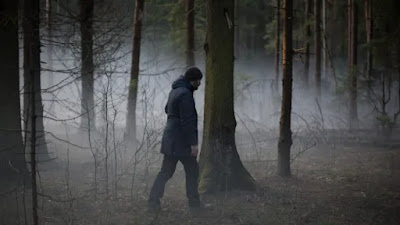If you're anything like me, you probably get fed-up with the same old, same old film recommendations from service providers and online platforms. True, there have been some fantastic films in recent years that more than hold their own against the classics of old (I'm convinced, for example, that Hell or High Water deserves to be ranked alongside Chinatown as a timeless masterpiece, and The Love Witch is a fully-fledged cult favourite waiting to happen), but I do get a little bit antsy constantly being told I should check out the usual, pseudo-serious Hollywood bilge like Manchester by the Sea, When a Star is Born and Oppenheimer as though these will somehow change my life. What about cinema further afield that is genuinely pushing in a different direction?
As such, I present a quick guide to ten world cinema films of the last fifteen years that I think deserve far greater exposure. Most of them should be on streaming services of one stripe or other, and there are at least two or three floating around on YouTube. Check 'em out: I promise they'll give you more to chew over than tripe like Barbie and Dune.
* * * * *
1.
Loveless
(Russia: d. Andrey Zvyagintsev, 2017)
A couple going through a bitter divorce argue over who gets custody of their 12-year-old son Alyosha. Both are in new relationships, however, and neither of them wants the responsibility. When Alyosha doesn't come home from school one day, they find themselves reluctantly drawn back together in their attempt to find him through a volunteer group. Bleak, stately and mature, this is filmmaking of the highest order.
2.
Hard to Be a God
(Russia/Czech Republic: d. Aleksei German, 2013)
On a distant planet identical to ours in its medieval period, a scientist from Earth posing as a nobleman observes the rituals and customs of a society trapped in barbarism and superstition. Tired of the seemingly never-ending purges of artisans and free-thinkers, he attempts to lead the people towards enlightenment - with horrific results. Truly visionary and painfully relevant.
3.
Phoenix
(Germany: d. Christian Petzold, 2014)
Recently released from Auschwitz, former nightclub singer Nelly Lenz (the ever-wonderful Nina Hoss) goes in search of husband Johnny in Berlin. When they finally meet, he doesn't recognise her due to the facial reconstructive surgery she's undergone as the result of a bullet wound, but considers her close enough in appearance to his wife to claim her inheritance. The tone is melancholic and measured, but when the emotion bursts through, boy does it hit.
4.
November
(Estonia: d. Rainer Sarnet, 2017)
A small village in 19th century Estonia is ravaged by the plague. A farmer makes a deal with the Devil to spare his son Hans and the girl he loves so his bloodline will continue. Unbeknownst to Hans, who lusts after the local Baron's daughter, a young woman called Liina has been practising some magic of her own to win his affections. Bursting with imaginative imagery, this is a lyrical feast for both the mind and the senses.
5.
The Salesman
(Iran: d. Asghar Farhadi, 2016)
A schoolteacher playing the lead role in an amateur production of Arthur Miller's Death of a Salesman is horrified when he discovers his wife has been sexually assaulted in their apartment. After learning that the former occupant was a prostitute and the assailant one of her clients, his self-worth begins to unravel as he becomes obsessed with finding the man responsible. Bold and honest, this is an excellent meditation on sexual mores and bruised ego.
6.
Stations of the Cross
(Germany: d. Dietrich Brüggemann, 2014)
14-year-old devout Catholic Maria prays to God every night in the hope that He will cure her younger brother's autism. When her prayers go unanswered, she offers herself as a sacrificial figura christi, taking on the sins of all around her. Harrowing and compelling in equal measure, theme and form are harmonised to such a degree that not a single shot is wasted.
7.
On Body and Soul
(Hungary: d. Ildikó Enyedi, 2017)
Abattoir workers Endre and Maria share a recurring dream they are a pair of deer in a forest. They become lovers, but soon discover the real world is no match for the mythical land that haunts their dreams. By turns tender and emotionally charged, On Body and Soul is a fascinating journey into the depths of desire and yearning that never short-changes the intellect.
8.
White Tiger
(Russia: d. Karen Shakhnazarov, 2012)
A Russian tank commander who miraculously survives death at the hands of a ghostly, seemingly indestructible German tank finds himself pursuing his would-be executioner through the bombed-out plains of the Eastern Front. Soundtracked by Richard Wagner and containing a number of allusions to Arthurian mythology and Moby Dick, White Tiger is a complex, beguiling masterpiece of magic realism that rewards repeat viewing.
9.
The Wall
(Austria/Germany: d. Julian Pölsler, 2011)
The terrific Martina Gedeck (The Lives of Others) delivers a career-defining performance as a writer on a retreat in the Austrian Alps who soon discovers she's separated from the outside world by an invisible barrier. Haunting and astonishingly beautiful, The Wall is a visual hymn to the fortitude of the human spirit and a truly mesmerising experience.
10.
The Extraordinary Adventures of Adèle Blanc-Sec
(France: d. Luc Besson, 2010)
The joker in the pack, The Extraordinary Adventures of Adèle Blanc-Sec is an unapologetically irreverent and loopy romp that makes Raiders of the Lost Ark look like a wilfully pretentious student film. Louise Bourgoin lights up the screen as the titular adventuress battling pterodactyls, Egyptian mummies and the occult in Paris at the turn of the last century. After this, you'll never look at a hatpin the same way again.













